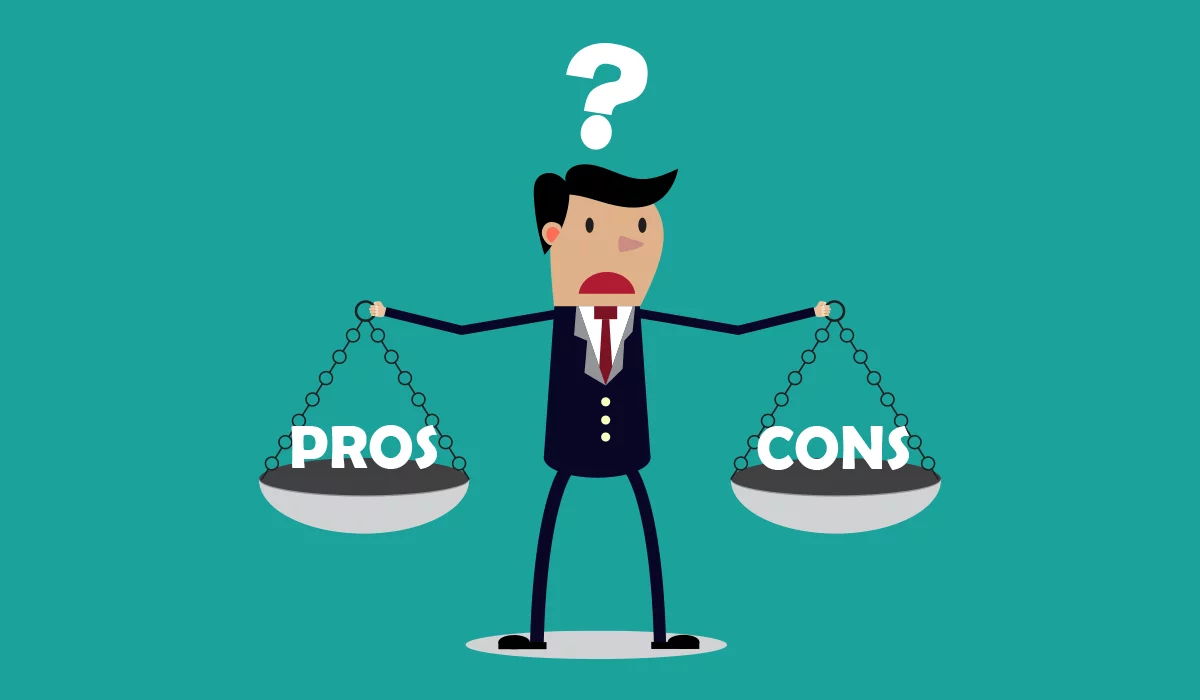Countless numbers of studies over the years have shown that college graduates experience lower levels of unemployment, and earn more, than their non-degree earning counterparts.
In addition to these statistics, there are also several other “pros” of obtaining a degree, such as increased access to job opportunities, personal growth, greater opportunity to build a professional network, and higher levels of job satisfaction, just to name a few.
While this information is good to know, it is also worth noting that obtaining a degree can be expensive. And by expensive, I mean very expensive.

So, for many students across the globe, the conundrum becomes “Is obtaining a degree worth the investment and debt that it is likely to incur?”
This may not be the answer that you want to hear, but the answer that I have for you is that it depends on a few different things. Most careers don’t require you to have a Ph.D., a greater portion will require that you have a bachelor’s degree, yet others might say that an associate’s degree or even a Professional Certificate is just the ticket.
So, before you dive right into a four-year college, or make the decision to go back to school to get your master’s degree, start with a little internal digging, or what I like to call, “soul searching”.
Ask yourself these questions to try to figure out if there is a career path or specific field that you know you want to pursue:

1.What are my interests?
In answering this question, you will want to consider some of the things that you are always game to learn more about and get involved in.
Now, not everyone is able to take the things that they are interested in and turn them into full-time jobs or careers. For example, I love to cook, but you won’t catch me leaving my day job to become a chef! However, depending on where your interests truly lie, taking those interests and incorporating them into your career might be feasible. Maybe you love helping children, in which case, there are tons of jobs and career paths out there that focus on that.
2.What skills do I have?
This question can usually be answered best by thinking back to past experiences that you have had, whether in specific jobs, your academic career, or in your everyday life outside of those areas.
You’ll want to try to come up with a list of both hard skills (i.e. web development, writing, mathematics) and soft skills (i.e. leadership, patience, agreeableness), since skills in both of these areas are key to success in most jobs.
One effective way to assess and develop hard skills is by engaging with structured learning platforms and practice environments, especially for technical fields like IT or cybersecurity. For instance, if you're interested in enhancing your knowledge in areas such as networking or system support, preparing for industry-recognized certifications can be a valuable path. These credentials not only validate your skills but also boost your confidence and job-readiness. You can learn more about how to practice for CompTIA exams and start developing real-world capabilities that employers look for.
3.What are my dreams?
This is the final question you will want to ask yourself. Think about if there is anything in particular that you have always said “Wow, I would love to do that for a career”.
Keep in mind that while some people know what they want to do early on in their lives, a lot of us do not, and it might take time to experience a few different options (and learn from them) in order to narrow down what it is we are actually passionate about.
In asking yourself these questions, and hopefully answering them in as much detail as possible, you are helping to illuminate the way in terms of getting to the bottom of determining which career path is the right one for you.
If this soul-searching activity has led you to make the decision that you will, should, or want to obtain a degree beyond your high school diploma, that’s great! However, you still may be wondering which type of degree is the right one for you.
Below, I have highlighted the main types of degree options that are out there, including key information on what type of student/career each degree is most-suited for and cost considerations to keep in mind.

What it is: Unlike an undergraduate degree, which often requires students to take courses that are not always 100% focused on their established major, a trade school degree or program is one in which you will likely focus solely on learning and becoming good at the trade in which you plan to pursue.
Trade school programs are generally significantly cheaper (usually between $5,000 and $15,000) and shorter than undergraduate degree programs (most can be completed in less than two years).
Who it’s designed for: If you are planning on entering a technical field in which you must have a very specific set of skills, then this could be the option for you. In fields such as HVAC, contracting, massage therapy, and hairstyling, employers put less emphasis on your degree credentials (i.e., where you got it from) and more emphasis on your skillset.
Pros:
-If you know exactly what you want to do and are simply looking to develop the skills you need to become certified for that specific trade, then this route will definitely save you time and money.
Cons:
-These degrees focus less on giving you the “overall package” in terms of learning about lots of different topics and meeting people who are pursuing degrees in other areas.
-By going the trade-school route and obtaining those specific skills, if you ever decide later on down the line that you want to sidestep into a different type of career, you may have to go back to school.
An undergraduate degree, which is typically the next-in-line degree that students will go for after earning a high school diploma, comes in a few different forms.
Usually, an undergraduate degree will consist of “general education” classes (which are broad) and major-specific classes (which are more narrowly focused on what area you want to pursue).
The two main types of undergraduate degrees are Associate (2-year) and Bachelor (4-year).
What it is: The associate degree is a 2-year degree that is normally obtained through community college. As of 2019, there were approximately 940 community colleges all across the United States. Despite this, there are some 4-year colleges and universities and vocational schools which also offer Associate degrees.
Who it’s designed for: The ideal candidates for an associate degree are 1) someone who is looking to approach the college process in a more economical way, and 2) someone who is looking to jump right into the job-world as soon as possible.
Associate degrees are more economical than Bachelor's degrees because the cost of attending a community college is generally much cheaper than attending a four-year college or university (because it is a shorter program and just because of the nature of the schools themselves).
Pros:
-If you are looking to save money and get into the job market ASAP, but you want to earn a degree and pursue a career in a field that is not covered by a trade school certification, then this might be a good option.
-Students can also use an Associate degree as a stepping stone into the Bachelor's degree to save LOTS of money (see “Transfer degree” below).
-Many associate degrees can be accomplished through online programs, which are often not only cheaper but allow you to attend classes virtually.
Cons:
-Depending on where you go for your Associate degree, you may find that the selection for majors is limited.
-Associate degrees (aka, community college) can sometimes be seen as less prestigious than a Bachelor's degree. Unfortunately, prestige is still something that most (but not all) employers consider when looking at your resume to determine potential prospects of employment.
-If you attend a community college, you may find that the atmosphere is not as vibrant or “happening” in comparison to if you were on the campus of a four-year college or university. This could be because many of the students who attend community college choose to commute. While this is great for saving money, it can mean that you will be getting less of the “traditional college experience”.
*Pro-tip: If you think obtaining an online degree might be a good option for you, be sure to do your research on accreditation, aka "the recognition from an accrediting agency that an institution maintains a certain level of educational standards".
What it is: The bachelor's degree is the type of college degree that is most commonly referenced when people talk about “going to college”. According to US News, there are over 4,000 colleges and universities across the US in which you can possibly attend to complete your bachelor's degree.
The bachelor's degree generally takes about 4 years to complete and is a required prerequisite to attending graduate school.
Most bachelor's degrees are composed of three different types of courses: general education, major-specific, and elective.
Who it’s designed for: Unlike associate degrees, there are generally a lot more options for majors and areas of study when you pursue a bachelor's degree. While there are MANY different types of bachelor degrees, the two most common are B.A. (Bachelor of Arts, which is usually liberal arts-focused) and B.S. (Bachelor of Science, which is usually more science-focused).
Most four-year colleges and universities offer hundreds of options for majors that students can pursue. These range from mechanical engineering to economics to psychology to textile and fashion design (just to name a few!).
Pros:
-The bachelor's degree is usually considered to be the degree that employers look for when you are applying for entry-level jobs after graduation.
-When you obtain your bachelor's degree, it generally places you in a higher potential earnings range than if you were to obtain a trade school or associate degree, which can lead to more opportunities for professional advancement, a greater level of job security, etc.
-Whether you live on campus or not, the majority of students who obtain bachelor's degrees from four-year colleges and universities tend to be involved in other activities and organizations that happen on and around campus, which can make it seem more vibrant.
-Oftentimes, there are lots of opportunities to network and meet students from different places who are pursuing degrees that can be vastly different from your own.
-Rather than just taking classes that are relevant to what you want to pursue, the bachelor's degree requires you to take general education classes first, which can be helpful if you are not completely sure what you want to do for your career (I know I wasn’t!).
Cons:
-The most obvious and biggest con to obtaining a bachelor's degree is that it is oftentimes extremely expensive, and has the potential to leave you with a fair amount of debt, depending on your situation.
What it is: The transfer degree is obtained when you start out attending a community college and, once you complete your associate degree at a community college, you can then transfer to a four-year college or university to attend for your junior and senior year.
Who it’s designed for: The transfer degree is designed for students who want to graduate with a bachelor's degree but do not want to pay the full sticker price of attending a traditional college or university for four or five years. Once you complete your associate degree at a community college, you can then transfer to a four-year college or university to attend for your junior and senior years.
Pros:
-The main benefit (and the reason why students will transfer) is because it can save you money since you will not be paying the price of attending a four-year school for all four years.
-If you are not sure if a four-year degree is right for you, starting out at community college and obtaining an associate degree might be a smart move, both for your career and for your wallet.
Cons:
-The only potential con to the transfer degree is that there is risk involved when it comes to transferring from a community college to a four-year college or university. This move can require a significant amount of time and effort spent into researching the process and figuring out which schools you are interested in are “transfer-friendly”.
A graduate degree is next-in-line degree after you obtain your bachelor's degree. Obtaining a graduate degree is by no means the norm, but depending on what field or career you are going into, it may be necessary.
The length of time to complete a graduate degree can vary immensely, with a time investment ranging from one to eight years. In terms of competitiveness, graduate programs tend to be more rigorous than bachelor programs, with more of an emphasis on individual research.
Some professions that require a graduate degree include physician’s assistant, social worker, and psychologist. For a more robust list, click here.
What it is: The master’s degree is a common type of graduate degree and can be pursued anywhere from directly following the completion of the bachelor's degree to later on in life. Master’s degrees do not have general education requirements and are focused specifically on helping you to gain more knowledge and advance your skills in the field that you intend to go into.
Most master’s degrees take between one and two years to complete. There are around 100 different concentration options for master’s degrees, but some of the most common areas of study include business administration (MBA), social work, engineering, and education.
Personally, I feel like the relevancy of obtaining a master’s degree has been contested in recent years. Some professionals that I have spoken to have advised me that it is not always worth the investment and that you can gain similar skills and experiences through a job in your desired industry. However, this is still largely a personal preference in terms of what you think will be the best for you.
Who it’s designed for: If you are looking to get an additional “leg up” in terms of looking good to potential employers, then having a master’s degree might be for you.
Pros:
-Greater earning potential than if you have just an associate or bachelor degree
-Makes you more marketable to employers
Cons:
-Can be very expensive!
What it is: The doctoral degree is one step up from the master’s degree. In order to be eligible to apply for a doctoral degree, you must have obtained your bachelor’s degree. Depending on the area that you are going into, you may or may not also need a master’s degree.
Doctoral degrees are the highest possible type of degree that a student can earn in a specific area of study. The two types of doctoral degrees are the Ph.D., which has an emphasis on research-based study, and the applied degree, which has an emphasis on teaching.
These degrees can take up to six years to complete, depending on the concentration.
Who it’s designed for: The doctoral degree is designed for people who want to enter into the “upper echelon” crew of higher education.
Pros:
-Having a doctorate degree typically means that you can expect to be paid more
-Often leads to greater job security
-People with doctorate degrees are pretty dang respected in their field! There is a significant amount of credibility that comes with obtaining a doctorate due to the amount of time and effort that goes into the process.
Cons:
-The fact that they can take anywhere between four and six years to complete makes them a significant investment of time.
-They tend to be especially challenging (since they are at the highest degree level)
-More money spent on education

So, I know that I have thrown a TON of information at you in this post. The main takeaway that I want you to get out of it is that there are so many options in terms of types of degrees that are out there for you to pursue. I am not saying this to overwhelm you, but rather to remind you that there is a path out there that is right for you.
Ultimately, the type and/or the number of degrees that you earn is dependent on factors such as your intended career, how much time you want to commit, and how much money you have or are willing to invest in your education.
Generally speaking, the higher the degree that you are able to obtain, the greater level of prestige you will be met with, which often comes with more money and more opportunities.
However, if, in order to obtain those degrees, you will have to set yourself back significantly on the money front, this is definitely something to consider ahead of time and factor into your decision-making process.
At the end of the day, regardless of what type of degree you are going for, the great news is that there are scholarships out there for you to apply for to help reduce your costs!
Head over here to our search tool to get started with your scholarship search.